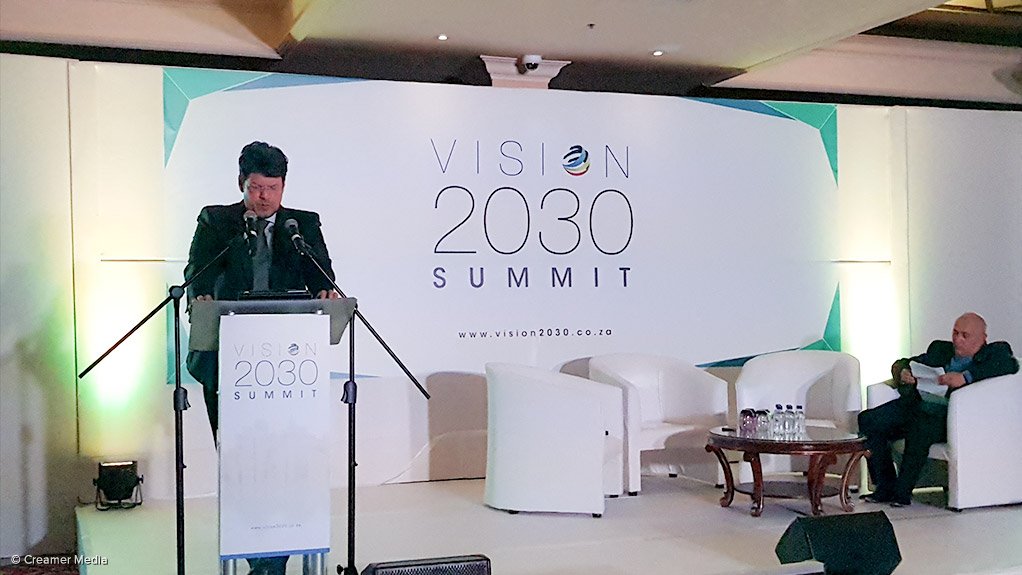Government is working to ensure that all distressed and dysfunctional municipalities have access to a district support team by December this year, says Cooperative Governance and Traditional Affairs Deputy Minister Andries Nel.
Speaking at the Vision 2030 Summit, in Johannesburg, on Wednesday, he highlighted that 87 South African municipalities are currently in distress.
Nel explained that the Department of Cooperative Governance and Traditional Affairs has deployed district support teams, comprising engineers, construction and project managers, financial accountants, town and regional planners and government and administration experts, to assist municipalities.
Such teams, he noted, have so far been deployed to 55 of the country’s most distressed and dysfunctional municipalities.
Nel further pointed out that, under the leadership of Minister Zweli Mkhize, the department is deliberately reaching out to all centres in South Africa’s society to assist municipalities.
“We have a duty and responsibility to ensure that those municipalities function the way they are supposed to; therefore, we are reaching out to academia, professionals and businesses to hear about their experiences with those municipalities, so that they can come in and assist”.
Further, Nel noted that to address the problems facing these municipalities, the department has initiated an intensive recovery programme focused on government service delivery.
“We’ve also taken measures to ensure that senior staff who are dismissed from one municipality, do not occupy positions in another municipality,” he added.
ENGINEERING FAIL
The key failure in local government, he lamented, is the inability of municipalities to adequately spend funds on basic infrastructure.
Of the 257 municipalities in South Africa, 226 currently receive municipal infrastructure grants. Only 55 of the 257 have a qualified engineer.
Nel noted that, since the 2012 financial year, R3.4-billion of the municipal infrastructure grants had been reallocated from underspending municipalities to those who were able to spend the funds.
“This effectively penalises not only poorer municipalities, but more importantly, it penalises the poor citizens of those municipalities that don’t have the capacity to use these funds”.
To overcome this, Nel said the department has engaged with a number of municipal organisations to assist it in ensuring that municipalities have the required skills to function optimally.
Using the skills shortage to empower the youth, the department's Municipal Infrastructure Support Agent (Misa) is involved with a number of programmes to upskill the youth.
Misa is responsible for delivering on the department’s infrastructure commitments.
As part of its skills development efforts, an apprenticeship programme works to train artisans to undertake the operation and maintenance of municipal infrastructure.
Further, a young graduate programme ensures that graduates are able to receive the necessary training to assist in the delivery of municipal infrastructure.
“We’re currently exploring partnerships in tertiary institutions to roll out our young graduates programme so that we can effectively address the skills shortage in municipalites,” said Nel, adding that these measures will hopefully go some way to transforming the municipal space, and promoting local economic development.
VISION 2030
Meanwhile, the National Development Plan (NDP) envisages that a larger portion of the South African population should live closer to their places of work by 2030, and that the transport used to commute should be safe, reliable and energy efficient.
This, Nel stated, requires five things – strong measures to prevent further development of housing in marginal places; increased urban densities to support public transport; more reliable and affordable public transport and better coordination between the various modes of transport; incentives and programmes to shift investment towards dense townships; and focused partnerships with the private sector to bridge the rising gap housing market.
“Our success or failure in this endeavour will really influence whether we become a nation untied in diversity, as our Constitution says, or whether we remain a country where we live together separately”.
The successful implementation of the NDP requires strong leadership from government, business, labour and civil society, said Nel, adding that South Africa needs society to work together towards a common purpose.
“To do this, we need to build trust between major [government] social departments,” he said.
He further reiterated government’s responsibility for a large share of implementing the NDP.
To achieve this, government will need to strengthen its accountability channel, improve its capacity, as well as be prepared to make difficult decisions, while working with others in society to solve the challenges, he suggested.
“This means communicating honestly and sincerely in government. The State needs to set the ethical bar for society as a whole. This makes it even more imperative that government acts to address the high levels of corruption in its ranks,” Nel warned.
EMAIL THIS ARTICLE SAVE THIS ARTICLE ARTICLE ENQUIRY
To subscribe email subscriptions@creamermedia.co.za or click here
To advertise email advertising@creamermedia.co.za or click here











